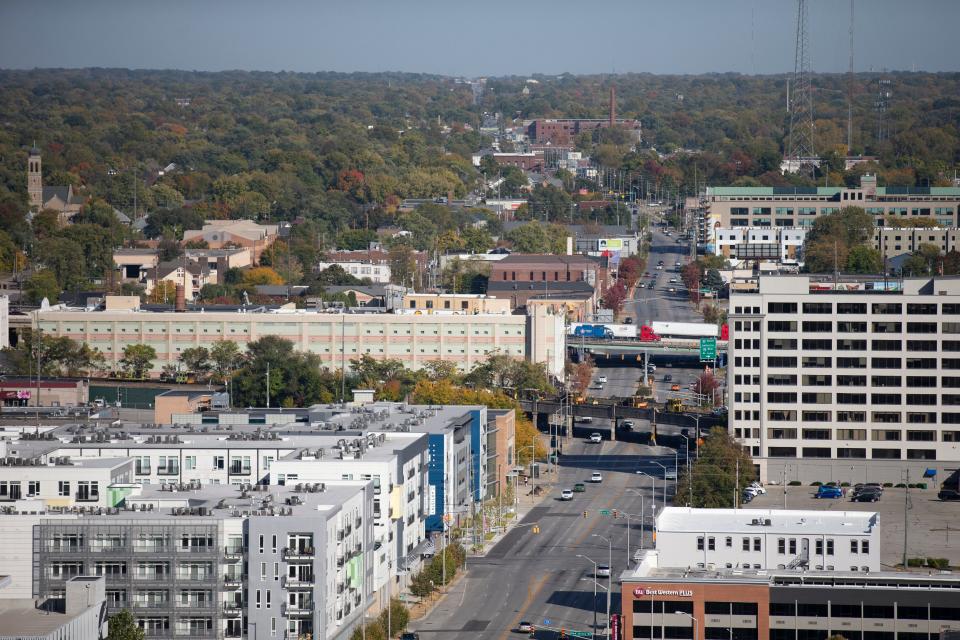Briggs: The view from Aaron Freeman's Indianapolis
Aaron Freeman doesn't hate Indianapolis. He sees it from a different perspective than most residents.
Freeman's frame of reference is the city's nether regions, where he has a large property with barns and 4-wheelers.
"I live generally in a more rural area," Freeman told me Monday, as the Indiana General Assembly convened for its annual session.
From that vantage point, the Republican state senator — yes, from Indianapolis — can't understand why IndyGo needs to dedicate two lanes of Washington Street to mass transit or why the city defied his 2023 law preventing right-on-red turns.

New year, same fights.
Freeman has introduced bills nullifying the city's right-on-red ban downtown and preventing the long-planned Blue Line, a bus rapid transit route, from capturing dedicated lanes along Washington Street.
IndyGo for years has said Freeman's efforts to block dedicated lanes would kill the Blue Line because the project wouldn't qualify for enough federal money if the plan called for shared lanes with traffic. This is the fourth consecutive year that the state legislature has been an existential threat to the Blue Line.
Freeman offered a wide range of reasons for those bills, including criticism of IndyGo's performance, questioning whether the transit agency has the wherewithal to even build the Blue Line ("I'd say it's probably 70-30 the damn thing doesn't get built no matter what I do," he said) and a belief that shutting lanes of traffic or banning right turns on red throughout downtown is the city's equivalent of taking a sledgehammer to a nail.
More simply, though, it seems Freeman is legislating in a way that's consistent with how he experiences the city.
As someone who lives in Irvington and works downtown, though, I have a different perspective. I worry not about violent crime, which sucks up much of the oxygen here, but rather about whether a reckless driver will run me off the road or whether a truck will slam into me while the driver ignores a signal at Washington and Meridian streets.
The Blue Line, in addition to being a transit option I would take downtown and to the airport, would also narrow a traditional highway — Washington Street, aka U.S. 40 — that is far too wide and too fast for a modern city. That might not have been its chief selling point, which Freeman noted, but it's a feature nonetheless.
Tightening roadways can be unpopular because people like to drive fast. But that has become one of Indianapolis' biggest problems: The traffic is flowing too freely, with out-of-control motorists racing across town and slamming into anyone or anything unfortunate enough to be in close proximity.
Many east-siders lost their minds last year when the Community Heights Neighborhood Organization put up barriers along bike lanes, and in the center lanes, on 10th and 16th streets. But, as Mirror Indy reported, people driving along the barriers reduced their speeds from about 40 miles per hour to 37 (still 2 mph above the speed limit).
All that project did was stop drivers from veering where they shouldn't be going anyway. A right-sizing of Washington Street could have a more profound effect, saving lives and making neighborhoods along the path, including downtown, more livable.
Likewise, the no-turn-on-red ordinance passed last year was an effort to tamp down on cars blowing through downtown intersections. I have doubts about its benefits, largely because police aren't enforcing it, but that's also one reason why the state legislature shouldn't be concerned about it.
Indianapolis, like many cities, has seen a spike in crashes killing drivers, pedestrians and cyclists. Freeman argues that's not a problem for a bus rapid transit project to solve, nor for a blanket red light ordinance spanning large swaths of the city.
"I disagree that IndyGo should be the tip of the sword on reducing speed limits or congesting traffic," Freeman told me. "If we're going to do that, let's take the time and do a study."
Studies are fine. But, at times when violent crime has been the topic du jour, Republican lawmakers have been prepared to throw anything they can against the wall.
Lives are at stake on Indianapolis' streets. Not just because of guns, but also because people drive their cars like weapons pointed indiscriminately at anyone in their (veering) paths.
I think Freeman cares about these issues — but in the ways of someone who enters downtown as a commuter seeking to get from points A to B as fast as possible.
Contact James Briggs at 317-444-4732 or james.briggs@indystar.com. Follow him on Twitter/X: @JamesEBriggs.
This article originally appeared on Indianapolis Star: Aaron Freeman returns to fight IndyGo's Blue Line, right-on-red ban

